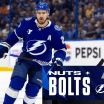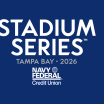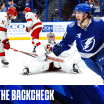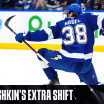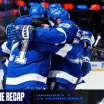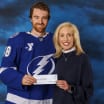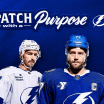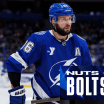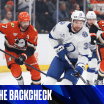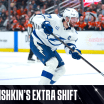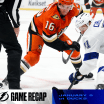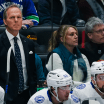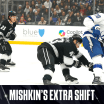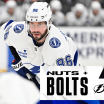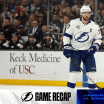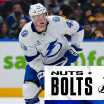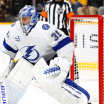Rick Peckham will begin his 24th season as the television play-by-play announcer for the Tampa Bay Lightning this fall and his 42nd season announcing pro hockey.
It will also be his last.
Peckham will sign off for the final time following the 2019-20 Lightning campaign, leaving behind a legacy as one of the most distinguished broadcasters in his field and the voice Lightning fans have come to love and, well, expect. Turn on FOX Sports SUN, and Rick Peckham is on the call, guiding the viewer through some of the greatest moments in the franchise's history and comforting them when things aren't going as planned.
In a special edition of In Their Own Words, as told to TampaBayLightning.com beat writer Bryan Burns, Peckham was gracious enough to explain why he's making the decision to retire now while he's still at the top of his game, what life will look like for him after retirement and document some of his favorite memories from an illustrious announcing career.
In their own words: Rick Peckham
Lightning broadcaster Rick Peckham announces he will retire following the 2019-20 season
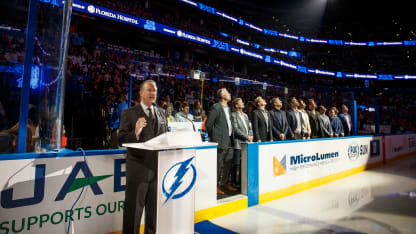
© Casey Brooke Lawson
A few years ago, I told myself, my family and a few close confidants that I was thinking about retiring from broadcasting once I hit the age of 65. Seems like it was just yesterday when I came to this decision, but now, all of a sudden, here we are. This will be my 24th year with the Lightning and 42nd announcing professional hockey, seven seasons with Rochester of the American Hockey League and 11 with the Hartford Whalers before coming to the Lightning. I just feel like I've taken my career as far as I'm going to take it. A goal of mine early on was to try to do national work. I've accomplished that. I'll broadcast this upcoming season of Lightning hockey and do what we do in terms of playoff coverage in the first round, but that's pretty much going to be it for me. I think it's time. I'll be 65 in late March. You start to realize how quickly the seasons and years are going by. I think I made a decent run of it, so now it's time to start thinking about doing some other stuff.
My wife Vicki and I love Florida. We're not going anywhere. It just felt like it would be a good time to kind of pull back and enjoy the time we have. Over the last couple of years, I started seriously considering retiring. Back then, it was, 'Well, let's see how you feel.' As I got closer, it felt like the time would be right to get off the train, slow down a little bit and enjoy Florida. We're gone for so much of the winter when it's so beautiful around here, let's start enjoying the things we're able to do thanks to the career and opportunities I've had. I think I've pretty much taken it as far as I can.
I'm looking forward to the opportunity to spend more time with my family. I have two sons, Alex and Matthew. Alex lives in St. Petersburg and Matthew is in Las Vegas. We only see Matthew a couple times a year. I'm able to see him when the Lightning go out there to play the Golden Knights. It seems like we always have a little extra time between games when we go to Vegas. Hopefully, it'll work out and I can get a couple days with him this season too.
It's surprising to me we've been here 24 years. I've seen a lot, but it just doesn't seem like it's been that long. The season itself has become more compact. That kind of gets to you at a point where you have to be focused on your next assignment, whether it's a radio show, a telecast, or hosting an event, something like that. I'm always, 'Okay, what's my next event? How do I prepare for it? What do I have to arrange to put myself into a position to best prepare for whatever my assignment is?' And that just dominates your thinking from September until the end of the season, could be six months, could be eight months, could be nine. You do that year after year after year, you start to think, 'You know what, it would be great to just kind of loosen that up a little bit.' So, I think that's kind of part of it too.
The thing about traveling, and certainly our hours are crazy, no question about it, but what it's done for me is I realized this almost 20 years ago, we go to all these great cities across North America and this year we travel internationally, but we're there for business. We're there a short window of time and we're there most likely in the winter. It hit me in the early 2000s, 'Wow, wouldn't it be great to come back here in the summer?' And from 2002 on, we tried to put together family trips in the summer to some of these cities. Our kids were old enough to appreciate what we were doing. We weren't just dragging them around in a stroller. They could enjoy some of the things you're doing. For example, 2003, we went out to California. There was a show on the Discovery Channel about roller coasters and my kids became big fans of roller coasters. My wife's always loved roller coasters and she still is an enthusiast. Thrill parks became kind of a thing for us that summer. There was a new one in L.A., so 'Let's do that.' We spent five days north of L.A. in Santa Clarita and we did Hollywood and all that stuff. Then we spent five days in the Anaheim area, went to Knott's Berry Farm. And this was the same time the Anaheim Ducks were in the Stanley Cup Final. We bought tickets to Game 6, which was the last game of the Final that was played in Anaheim, and we ended up going to the game. And it was just such a great thrill. That started it. Next year was New York and Boston. The year after it was Philly. Then Washington, Chicago. We would go to these great cities and have just a great time and great family memories, so through hockey you were exposed to the possibilities in some of these cities and in the summer had the time to go back there and really relax and enjoy. I think that's a big part of the benefit I've gotten out of these last 24 years with the Lightning.
I don't have any firm plans after retirement, but I think Vicki and I are going to do some traveling. She's taken a couple European trips. My son studied over there one time and she went over and they had a great trip. And I'd like to do some of that stuff. I've been to Europe a couple times, but mostly it's been hockey related. Austria in 1998 with the Lightning. Prague. But we were just barely there. We'll go to Sweden this year. But just doing stuff with my wife where my opportunities to travel previously have been hockey-centric, team-centric and there isn't a lot of opportunity for family time. I'm looking forward to that as well as enjoying the Florida winter a little bit more and doing things at my pace, being in control of my schedule. We don't have all the details worked out yet, but we have tickets to the British Open next summer in England. It's not something I couldn't have done working in hockey. It's in July. But it's just an example of now I'm focusing on traveling with her and doing some of these special things at our pace.
I'd love to maintain a connection to the Lightning post retirement. I'm not sure what that will entail, but we'll work all of that out soon enough. The other thing too is I'm such a sports fanatic. As far as I can recall, I've loved sports and pretty much all sports. I'm looking forward to enjoying more of the other sports that you kind of put to the side as you concentrate during the season, whether it's going to a live game, whether it's the Lightning or seeing a USF basketball game. I kind of grew up on basketball in southwestern Ohio. I haven't been able to go to too many basketball games because of the overlap with the hockey schedule, but I'd like to attend more games in the future. I want to be able to just say to my wife, 'Let's go to an iconic football site like The Big House or Notre Dame Stadium or that kind of thing,' and we can leave on a whim. Those opportunities will be there, it's just a matter of what do you want to do? Like the British Open. That's not something I have to work around a hockey schedule to do, but maybe it will be a chance to go to The Players Championship or something similar that occurs during the hockey season.
I think back to my first game broadcasting NHL hockey in 1984 when I was the play-by-play announcer for the Hartford Whalers. The game was at the old Boston Garden. I think I tried to jam four games worth of information into one. That was one thing I used to do early on in my career. Big mistake. 'You've prepared all of this information, let's get it in,' is the thought process that goes through your head. It's something you learn over time you don't do. And I was so nervous. I had a light gray suit on, and I think my armpits sweated all the way through it. This was the big time, the NHL in the Boston Garden. When I first started following hockey, I was in high school. It was the year Phil (Esposito) and Bobby (Orr) and all those guys won the Cup in 1970, so I became a Bruins fan. It was cool to have that first game at Boston Garden where the great Bruins teams had played. Now, getting to work for teams that were not the Boston Bruins, you learn to not root for the Boston Bruins pretty quickly. And certainly, in Hartford, they had somewhat of a rivalry with the Bruins. The Whalers felt it was a pretty strong rivalry. I don't think the Bruins looked at it that way. Over time, you sort of pinch yourself and think about how lucky you are to do your dream job in these iconic buildings all over North America. But at the moment of that first game, it's like, 'How am I going to get through this?' With just about anything else, the task wasn't nearly as difficult as you think it's going to be, or you make it out to be. You look back on it and thinking about the highlights, being at the Garden, it's a big thrill. I'll tell you what, right behind that first game as far as memories that stick out would be doing the first game at what's now AMALIE Arena. That was huge for me. Such an unbelievable atmosphere surrounding the game, playing the Rangers, Wayne Gretzky there, the Lightning winning, everybody in a tux and dressed up. That was a huge, exciting moment for me in my career. I had only been in Tampa one season before that. I certainly wasn't there through the struggles of, 'How are we going to get out of Expo Hall? Where the heck are we going to play? Are we ever going to get a building downtown?' I wasn't a part of that whole effort, but you could tell, the Lightning now had a home. It was like New Year's Eve, the Stanley Cup Final, Opening Night all rolled into one. It was pretty cool.
I think the hardest part about retirement will probably be not seeing a lot of the people you're used to seeing, whether you're at AMALIE Arena or on the road. To me, the best part of this job is not necessarily the games that you remember, it's the people, it's the people you work with. Reunions are great. It's those people that you've known and maybe kept in touch with through the years that really are what you take out of your experience with this job. The games are great, but there's been so many of them. There's been so many people through that time too. But you think about it, what do you remember most? You remember the people.
When I think about the biggest accomplishments from my career, the opportunity to do national games would probably be right up there. I did my first ESPN game in 1987 and then did some work for SportsChannel America, which it just so happened the company I worked for had the national rights. We really didn't have great coverage around the country, but it provided you the opportunity to do a lot of higher-profile games. And then the NBC stuff. And Versus obviously. That's the top of your profession is that network opportunity. I've had a number of those, and I'm pretty proud to be able to do that.
That first ESPN game, crazy story. I was doing the Whalers. Bruce Connal, who just recently passed away in the last year or so, was doing the games, and I got to know him because the Whalers and ESPN were neighbors basically. So, he said, 'I'd like you to do this game. It's a Sunday night in Edmonton, St. Louis at the Oilers. The only problem is you've got a game in Hartford on Saturday night. So, I'm going to have a car meet you in the morning, take you to the airport, you'll connect in Toronto and then land in Edmonton in time to do the game.' This is probably my third year in the NHL. I'm like, 'Okay, big responsibility, but let's do it.' Sure enough after I finish announcing the game in Hartford, the car comes to take me to the airport and the plane takes off in New York on time. We get to Toronto, and, of course, there's a snowstorm. This is obviously way before cell phones where I can easily call Bruce and tell him we're delayed. We sit on the runway for about an hour. Finally, they decided to take us back to the gate. So now I've got a chance to get off the plane, find a pay phone, call Bruce and tell him, 'Look, I don't know how long I'm stuck here.' So, he starts calling around. And who does he call? Chris Cuthbert, who's still doing NBC, does TSN. Only problem Bruce can't get a hold of Chris because Chris' then two-year-old son had taken the phone off the hook. So, we've got no one lined up for this game. Bruce finally gets through after Chris realizes his phone's been messed with. Bruce lines up Chris to fill in for me. Chris lives in Edmonton. He shows up. Meanwhile, we finally take off from Toronto, but I'm going to get there late. Bruce is like, 'You're doing the game whenever you get there.' So, we land in Edmonton, and if you've ever been to Edmonton, the airport is pretty far outside the city. It's a long trip to the arena. So, I'm in a cab and this driver's really busting his butt to get me to the arena. We're listening to the game I'm supposed to be broadcasting on the radio. I get to the arena early in the second period. Bill Clement's the color guy. The broadcast goes to commercial, Chris leaves and I come in and take over from there. It was absolutely unbelievable. It was just like a line change. That was the first national game I ever did.
If there's one thing I wish I could have done in my career that I didn't, I suppose it would be calling a Stanley Cup Final game. We used to up until 1994, after the Rangers won, that was the last year that local broadcasters could do the Cup Final. After that year it changed, and it was more the NBA model the NHL followed. You could do the first two rounds out of four. Chief and I did the Montreal series [in 2004 when the Lightning won the Stanley Cup] but that was last series we could broadcast during that run. Fortunately, we could stay involved with the pre- and post-game shows, but that's not the same. That's just the nature of the business. You know that going in. If you're going to do TV, there are some benefits and then there are some other things that don't work quite as well. When the Lightning won the Cup, Chief and I were outside the arena on the plaza watching the game on the side of the parking garage. My family was inside. I was outside. We were hosting a post-game show for Sunshine Network. We were on the air for what seemed like forever. Finally, over an hour after the game, Chief and I are like, 'We're going inside. We're going in the locker room to see what's going on.' It was the last break, we were off the air after this, I'm telling the producer. Sure enough, we get off the air, go in the locker room, the guys are still there celebrating. It was pretty cool to finally get in there. To host that whole thing, that particular year, Don Cherry was on our show. We had a bunch of people on the show. We really made the most of that opportunity to do those pre- and post-game shows. It was pretty cool.
I tried to develop my own style as a broadcaster, but of course, there are people you try to emulate when you start your career because you appreciate how good they are at their job. Dan Kelly was one. When I started watching hockey on TV, CBS had the game of the week, and Dan was the play-by-play voice. He was also doing the Blues games, so you could listen to the radio broadcast in the old transistor days. You could also pick up the Bruins games, so I listened quite a bit to Bob Wilson and Fred Cusick. Funny story about Bob Wilson, when I was working in Rochester, we were the Bruins affiliate the first two years. So, they would play an exhibition game against the Sabres in Rochester at the War Memorial. I was also the PR director for Rochester, so I had to set up the press box. I wasn't broadcasting the game; I was just doing the PR functions. The game ends and Bob's doing his wrap-up show and pretty much everyone else is gone. I start unplugging the phones because we stored them in a cabinet, so we didn't leave them out. I unplugged Bob accidentally and took him off the air. He wasn't too happy. He's doing his post-game wrap up, and I unplugged his phone line about 30 feet away. Took him off the air. That was pretty interesting.
Times like these you reflect on everybody that was part of the effort of not just starting the Tampa Bay Lightning from scratch, but from below the ground, Phil and that group putting a team together and trying to convince the community that, yeah, there's a good reason why there's a hockey team here. I came in here in year four, but I had experienced coming in as a visitor and knew what they were up against. And you see first-hand from playing at Tropicana Field to the new building to some real scary moments in the history of this franchise. Thank God Palace Sports came along when it did, but we were in total limbo from 2006 to 2008, like 'Who's going to buy this team?' Really, the whole thing was in a state of flux. Then there's some relief but you realize the owners that come in aren't really equipped to succeed. There were some tense moments through the years but just kind of seeing where this whole market is, not my experience, not anybody else's experience from the inside, but just how the fans have stayed with this team, come back to the team, where it is now. It's just an amazing story. You kind of have a rinkside seat for all of that, the fortunes of the team on the ice, the fortunes off the ice, seeing the fanbase expand, getting to know people and how their fandom has evolved from, 'I'm not renewing my seat' to 'I am renewing my seat' to 'I'd love to buy 10 more seats', just how it's grown into one of the very best hockey markets in the league, the greatest league in the world, pretty good story.
And a lot of the credit for that has to be given to Jeff Vinik. He brought stability. He brought professionalism to every aspect of the franchise. It's in such a good place now. You could never imagine the scenario that exists now with the franchise back in those early days. I remember watching highlights of Tampa Bay's first-ever game on ESPN and just laughing, like 'That's a hell of a way to start.' Beating the Chicago Blackhawks. The four goals from Chris Kontos and, 'Hey, looks like they filled the place.' And then the first time you go there, seeing how small Expo Hall was and realizing how different an NHL experience this was in Tampa Bay. Not that I doubted if the team would make it. Someone like Phil put it together, after all. But it was so unlike any other market. I could have never imagined I'd be living here, working here back then. Now I've been here 24 years. You see what it is today.
Incredible.

